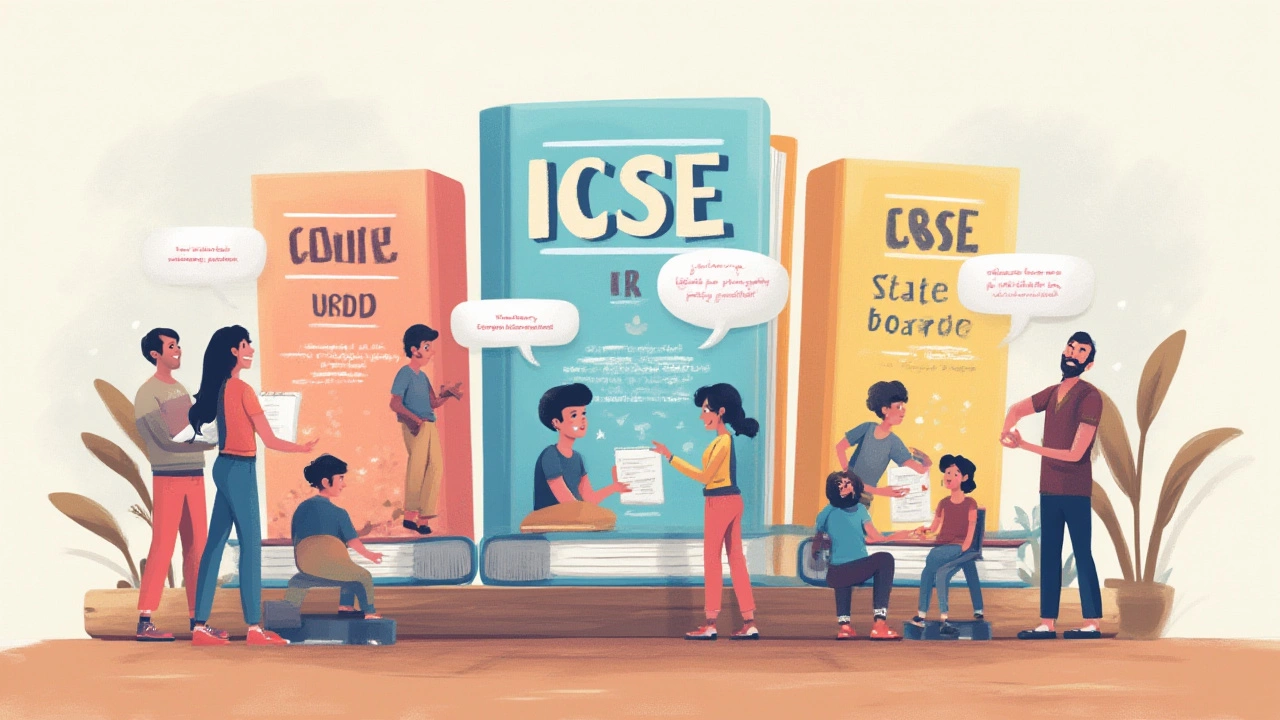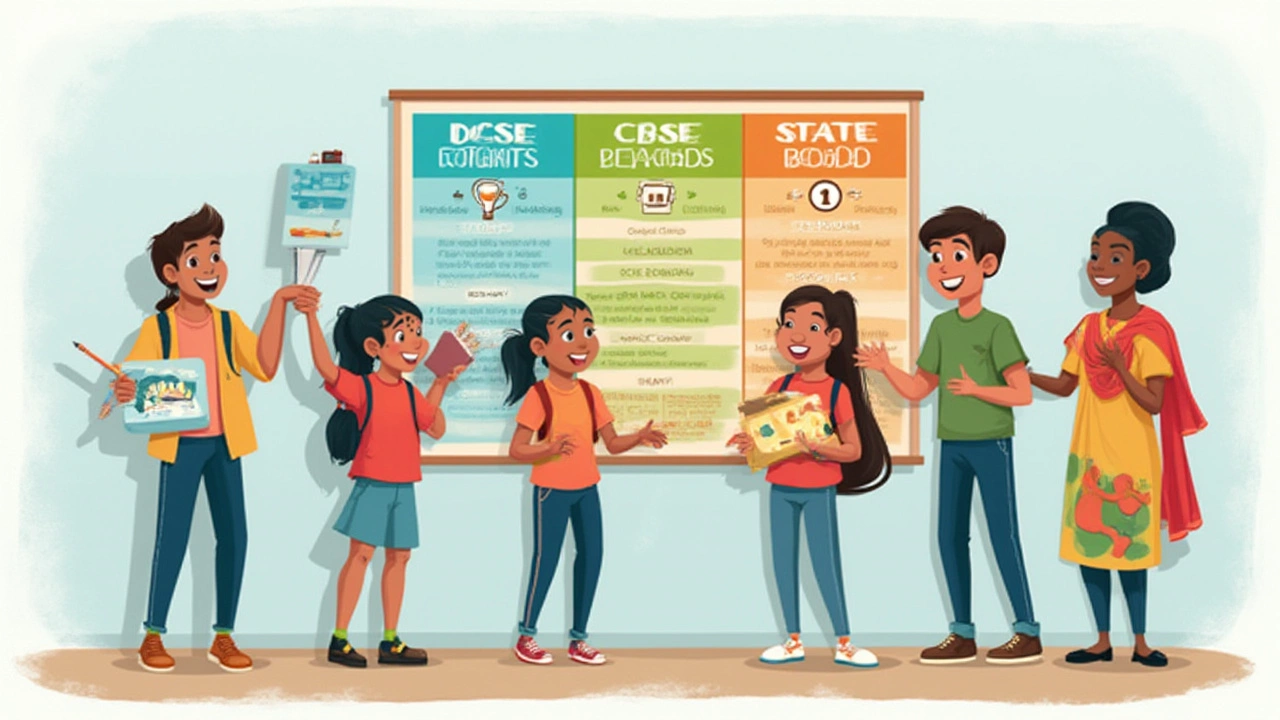The question of which is the easiest board in India sounds simple, but it always sparks fierce debates between students, parents, and sometimes, even dogs—at least in my house, where Paco barks the loudest during exam season. Everyone wants to know which path lets you score higher without crying into your textbooks at 3 a.m. Is it CBSE, ICSE, or one of the wild variety of state boards? As the education maze in India keeps growing thicker, picking the ‘easiest’ route gets trickier. What’s truly easy? Fewer subjects, flexible marking, straightforward English, less memorization, or just the comfort of a familiar language? There isn’t one straight answer because what’s a breeze for one student might be a tornado for another. Still, let’s break it down by the facts, look at the boards one by one, and uncover what students and teachers actually experience.
The Big Indian Boards: Syllabus and Exam Patterns Under the Microscope
If you ever stood at the school gate listening to parents compare notes, you’d think CBSE and ICSE were two distant planets—or sworn rivals. Both are ‘national’ boards, but they take drastically different approaches. CBSE, short for Central Board of Secondary Education, is everywhere: Delhi, Bengaluru, Kolkata... you can almost spot a blue-and-white CBSE school sign wherever you travel. Their curriculum feels like a well-oiled machine: science, math, social studies, languages, all lined up neatly. For most students, the real charm is its focus on clarity, not detail overload. If you ask, "What is the easiest board in India?" you’ll get a lot of people pointing at CBSE because of its direct approach to core subjects. Teachers praise its structured layout and the annual exam pattern. Plus, the syllabus syncs with India’s biggest competitive exams, from JEE to NEET, making it the perfect launchpad if pocketing top marks is your goal.
Flip over to ICSE (Indian Certificate of Secondary Education) and the story changes. Here, English isn’t just a subject; it’s the language of life. Essays, stories, explanations... ICSE wants you to love details and never skim past a chapter. It emphasizes literature, grammar, and practical application. This makes ICSE a paradise for English lovers but sometimes a nightmare for anyone dodging creative writing. Its syllabus can feel much deeper and broader, with subjects like Environmental Education and even Commercial Studies at times. The board leans strongly towards understanding and analysis, often making students feel like they are journalists investigating every chapter.
Then there are the State Boards: Maharashtra, Tamil Nadu, Kerala, Karnataka, UP, Gujarat... the list goes on. Each has its flavor, preferred language, grading style, and, yes, difficulty level. State boards typically align their textbooks with local needs. Their exams often focus more on recall and less on analysis—at least compared to CBSE or ICSE. Students say that many state boards have easier question papers, especially for those who study in the regional language. These boards sometimes have lower pass marks, more straightforward marking, and fewer distractions in the form of extra-curricular projects or essays. Does that automatically make them the easiest? It’s not that simple.
| Board | No. of Schools | Subjects (Class 10) | Pass Percentage (2024) | Medium of Instruction |
|---|---|---|---|---|
| CBSE | 27,000+ | 5-7 | 93.6% | English, Hindi |
| ICSE | 2,300+ | 8-10 | 98.5% | English |
| Maharashtra State Board | 21,000+ | 6-7 | 96.1% | Marathi, English, Hindi |
| Karnataka State Board | 16,000+ | 6-7 | 88.7% | Kannada, English |
| Tamil Nadu State Board | 12,500+ | 6-7 | 91.5% | Tamil, English |
So, what does this means in practice? For a student aiming for medical or engineering, CBSE’s approach makes things smoother when prepping for exams like JEE or NEET. For someone who loves reading, writing, and thinking deeply, ICSE feels like home. If language comfort and less academic stress matter most, a local state board often turns out to be the path of least resistance. But no matter the board, each one has its ups and downs. Textbooks, projects, exam patterns—they all play a role in how ‘easy’ or tricky life becomes from April to March.

Student Experiences: Truths from Classrooms and Exam Halls
Maybe you remember your own board exams, the furious scribbling at the desk, that moment when your mind blanked and Paco (well, in my case) looked at you as if to say, "Just take me for a walk, don’t worry about algebra!" What’s it like for kids and teens today? I spent time reading through student forums, talking to old school friends, and hearing out stories from current students.
Start with CBSE. Students mostly like the predictable format—chapters and questions that repeat with minor tweaks every year. It’s like eating from a familiar menu: you know you’ll get dal, rice, and a paratha. Some of my friends, especially those aiming for engineering or medicine after school, swear by CBSE’s precise approach. No surprise, then, that so many coaching classes use CBSE books to cover basics. If your target is scoring well and cracking Indian competitive exams, CBSE often feels supportive, not an obstacle course. Teachers also point out that CBSE updates its textbooks every few years, but keeps major concepts stable—so once you’ve got the hang of it, nothing feels too tough.
Move to ICSE and the mood changes a bit. Students rave about their rich vocabulary and ability to write essays that actually sound interesting. Leah, my partner, attended an ICSE school and says her English teachers could sniff out plagiarism from a mile away. That’s the upside: ICSE graduates often shine in college-level writing and analysis. But it comes at a cost—a heavy workload, lots of writing, and frequent assignments that leave some students stretched thin. The marking can be strict, and with more subjects, there aren’t many shortcuts. Many students say the extra subjects—like Art, Environmental Science, Moral Science—are both a blessing and a curse. You emerge well-prepared, but the exam season feels relentless.
The picture in state boards is often more relaxed. There’s a comfort in learning in your mother tongue and sometimes even choosing easier streams. The exams usually focus on the textbook itself—memorize, write, repeat—so if you’re diligent with your notes, chances are high you’ll score well. Most state boards are less fussy about language, and there are rarely any nasty surprises in the question paper. When I asked a friend from the Maharashtra board, she said she appreciated the low-key approach. Fewer after-school tuitions, less late-night stress, and more time for cricket in the evenings. That’s not to say all state boards are the same; urban schools, especially private ones, may raise the bar with tougher assignments. And while results can be stellar, some parents worry whether the focus on recall prepares students for competitive exams where concept clarity is king.
- CBSE’s multiple-choice (MCQ) patterns in recent years have cut down long, wordy answers—a relief for anyone who hates essay questions.
- ICSE students cover literature classics even in their early teens, which builds reading habits but can feel taxing.
- State board kids enjoy festivals and events as part of the curriculum. Less homework and internal tests, more time for hobbies.
- Marking in some state boards is lenient, meaning almost everyone passes, but high distinctions are trickier to grab.
- Urban state board schools sometimes copy CBSE’s style to make their students more competitive—so city versus rural experience can be vastly different.
No school board is immune to pressure. If your teacher’s tough or your family expects you to be the next Sunita Williams, even the “easiest” board can keep you up at night. But in terms of daily life, ease of scoring, and balanced workload, students point most often to their own comfort with the board’s language and the school’s teaching style—sometimes, more than the board itself.

Tips, Trends, and The Future: What’s Changing for India’s Students?
A decade ago, students followed whatever board was closest to home. Now, families are relocating, choosing schools based on exam prep, and even picking boards based on which university demands what scores. And things have definitely shifted since the lockdown days when online learning became the new normal.
CBSE remains the most popular, with the highest number of affiliated schools. If you’re aiming for Indian government jobs, engineering, or medical, easiest board in India queries often stop at CBSE because its syllabus matches entrance tests so closely. State boards, meanwhile, are catching up: Karnataka and Maharashtra have overhauled their syllabi to make them sharper and more concept-based. In Tamil Nadu and Kerala, digital content is now standard, and schools are nudged to offer English-medium streams alongside regional languages. If you’re looking for pure ease—less syllabus depth, simpler exams—choose a reputed state board school, especially if you’re studying in a familiar language. But remember, some private state board schools have set tougher papers to match CBSE’s rigor.
If English is your strong suit and you love literature, ICSE’s curriculum will make you a better writer and a critical thinker. And if you’re highly academic, aiming for international universities, IB (International Baccalaureate) and Cambridge (IGCSE) programs are spreading through India’s metros—though they’re not cheap and are rarely the “easy” option unless you love project work and open-ended questions. Keep in mind, Indian states like Telangana and Gujarat are merging their boards—so the borderlines between their syllabi are fading fast. In 2024, Maharashtra and Goa announced a joint science syllabus, aiming for parity with CBSE and better prep for national Olympiads. So the old binaries—CBSE for toppers, State boards for locals—are blurring.
- Check the board's recognition with colleges and employers in the field you want. If you want to join the army, for example, CBSE and state board results are both valid, but some fields may prefer one over the other.
- Look at the school’s own track record. Sometimes a private state board school in Hyderabad outshines a local CBSE school just because of the staff and teaching style.
- Syllabus updates happen every 4-5 years. If you’re looking at sample papers, make sure you’ve got the latest versions.
- If you switch boards during your schooling, prepare for some gaps. ICSE to CBSE? Science doesn’t change, but literature and social science subjects will need extra study.
All in all, there’s no one-size-fits-all answer. If you want easy marks, a calm school environment, and time to walk your own dog (or cat, no judgments), a state board in your first language usually wins. If you crave tough competition, university-level English, or easy access to national-level tests, CBSE or ICSE might edge ahead. Nobody knows your learning style better than you and your family. Paco definitely doesn’t, but he still likes to nap on whichever textbook is open on the floor.
Whatever your choice, know this: exams will pass, boards will change, but finding a style that fits you is half the battle won. Don’t just follow the crowd; look for the path with the fewest potholes for you.
